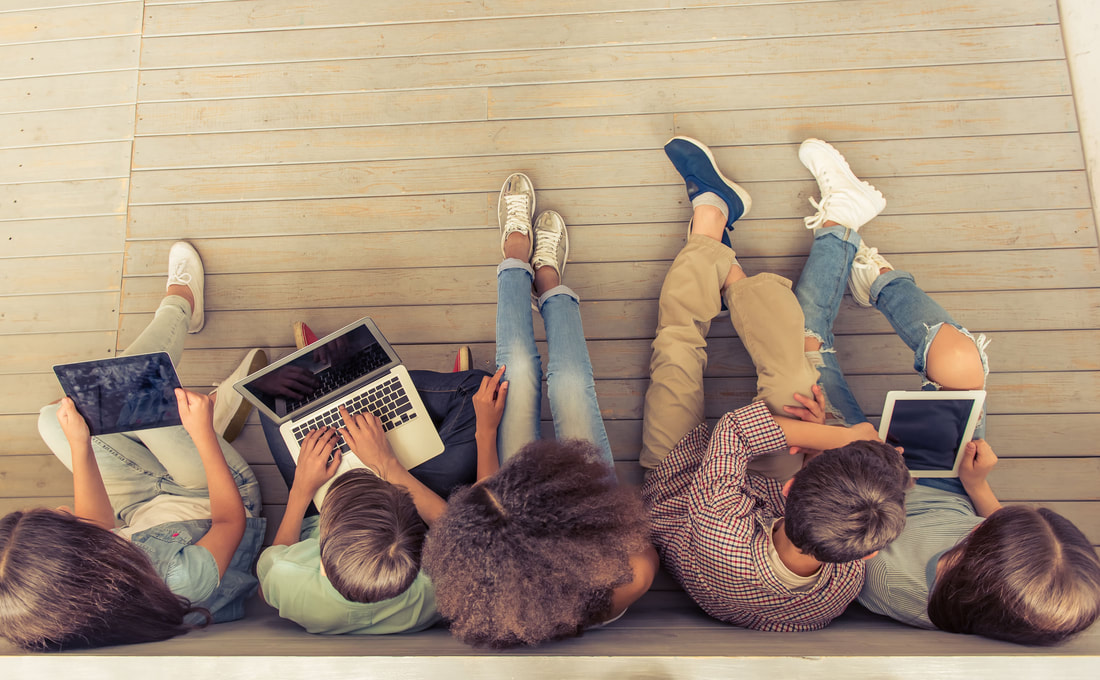The mission of the Partners is to increase youth’s development chances through access to high-quality education adapted to contemporary challenges. Teachers, educators and psychologists from partner institutions want to jointly develop the didactic offer in an area that turned out to be extremely important, especially during the fight against COVID19. Polish schools note problems with engaging students in learning outside the school walls, while the Icelandic partner records the opposite. For many years the IEC Group has promoted language learning based on remote school collaboration. But for a long time many potential users weren’t ready for ideas based on remote communication. Two schools from Poland have already gained experience of lessons in the Connect2Learn formula - a pilot project with JIS from Indonesia in 2019. The efficacy of this method convinced teachers from Katowice and Kielce of the need for new educational modules. It is worth adding that these two high schools represent different segments of education. High School in Kielce - a public one, as an integration institution, faces the challenge of inclusiveness. Private High School in Katowice has a multicultural community. The need to build-up cooperation across barriers gets two different contexts.
The presence of the Olafsfjordur school is crucial due to MTR’s remarkable distance learning experience. Their teachers can boast of their own highly effective know-how resulting from freedom in choosing the techniques of teaching. MTR school is a European leader in adapting the edu-process to technological development advantages. up!homo, (created to develop new tools supporting teaching), with psychologists and experience in coordinating international projects, joins the team. Openness to change, activity in sharing knowledge about innovation in education and the potential to use and promote the results of the project were the key to this partnership.
The presence of the Olafsfjordur school is crucial due to MTR’s remarkable distance learning experience. Their teachers can boast of their own highly effective know-how resulting from freedom in choosing the techniques of teaching. MTR school is a European leader in adapting the edu-process to technological development advantages. up!homo, (created to develop new tools supporting teaching), with psychologists and experience in coordinating international projects, joins the team. Openness to change, activity in sharing knowledge about innovation in education and the potential to use and promote the results of the project were the key to this partnership.
The area
|
Our mission is to develop inclusive education. Thanks to the introduction of pedagogical innovations to distance learning and a change in teaching style, the degree of disadvantage of Polish students in accessing modern education will decrease. The Connect2Learn collaborative learning formula focused on linguistic communication of students during remote project collaboration perfectly supports the inclusiveness of the pedagogical process. Incorporation of international school practices, including the European leader in hybrid learning, will allow Polish schools to change not only the way of teaching, but also the attitude towards groups particularly vulnerable to social exclusion (people with disabilities or limited mobility). Learning together, achieving common goals across divisions is an excellent form of supporting a society open to multiculturalism, which is the long-term goal of Connected Learning educational modules. Development of a quality culture in the education sector -
|
The project leads to an increase in the quality of education by providing a wide range of guidelines and inspiration for the use of effective teaching methods, increasing the effectiveness of the teaching process, without interfering with the school curricula. The principle of students participating in decision making about the way of solving tasks in group collaboration and the elements of self-evaluation implemented during cooperation foster in students a sense of responsibility for the process and promote thinking about the consequences of undertaken actions. This significantly improves the quality of their education, changing their attitudes towards both communication in a foreign language and education in general, in line with the motto of one of the IOs of the project “from teaching to learning”.
Additionally, raising the competences of teaching staff, both digital and pedagogical, will have a positive impact on the quality of education in schools that will implement new educational tools provided by the project. International cooperation of schools and students (enabled by the Connect2Learn formula) will have a lasting positive impact on the quality of the educational offer.
What about the impact of the project on other areas?
Adapting education to current development challenges - The project will provide a stimulus to change the education system at secondary school level, helping both teachers and students (final beneficiaries) to develop key 21st century competencies.
Raising the level of skills and increasing the competences of students and employees of the sector education - representatives of teaching staff will take part in various forms of improving their skills (also as part of mobility and exchange of good practices), they will also jointly develop didactic materials constituting the IOs of the project, which will then contribute to strengthening the competences of their students. On the other hand, the promotion of the project results will have a positive effect on the skills and competences of teaching staff (and indirectly pupils and students) in a wide range of EEA educational institutions.
Developing cooperation between entities from Poland and donor countries within the area of education - the combination of 4 entities active in the field of education from Poland in a lasting partnership with the European leader in remote / hybrid education from Iceland will contribute to strengthening bilateral cooperation within the EEA. Effective dissemination of the project results assumes the extension of this cooperation to, ultimately, several dozen other middle-level educational institutions.
Additionally, raising the competences of teaching staff, both digital and pedagogical, will have a positive impact on the quality of education in schools that will implement new educational tools provided by the project. International cooperation of schools and students (enabled by the Connect2Learn formula) will have a lasting positive impact on the quality of the educational offer.
What about the impact of the project on other areas?
Adapting education to current development challenges - The project will provide a stimulus to change the education system at secondary school level, helping both teachers and students (final beneficiaries) to develop key 21st century competencies.
Raising the level of skills and increasing the competences of students and employees of the sector education - representatives of teaching staff will take part in various forms of improving their skills (also as part of mobility and exchange of good practices), they will also jointly develop didactic materials constituting the IOs of the project, which will then contribute to strengthening the competences of their students. On the other hand, the promotion of the project results will have a positive effect on the skills and competences of teaching staff (and indirectly pupils and students) in a wide range of EEA educational institutions.
Developing cooperation between entities from Poland and donor countries within the area of education - the combination of 4 entities active in the field of education from Poland in a lasting partnership with the European leader in remote / hybrid education from Iceland will contribute to strengthening bilateral cooperation within the EEA. Effective dissemination of the project results assumes the extension of this cooperation to, ultimately, several dozen other middle-level educational institutions.
Objectives
The Connected Learning Project will facilitate long-term cooperation of educational institutions, incorporating modern teaching methods, the promotion of which, using appropriate ICT tools and new e-learning channels, will help disseminate collaborative learning concepts in Poland and EEA. The aim is to develop education at the secondary school level by implementing innovations to better adjust the education process to current needs of the social and economic community.
The project will increase staff competences and show how to change the outdated pedagogy into a student-centered one, where teachers, once the ”knowledge providers,” become inspiring advisors. By sharing experiences in remote education, practitioners from donor countries will trigger creative teamwork and the creation of a new, interesting offer.
The Intellectual Outputs will expand the knowledge base in Poland. Teaching materials will help augment traditional classroom education with intercultural collaborative e-learning. The project relates to the Program objective by building an institutional partnership to improve the quality and adapt the educational offer to the challenges of a changing world. It also contributes to strengthening human potential by enhancing school operations so that young people increase their creativity and improve their chances on the 21st century labor market.
The project will increase staff competences and show how to change the outdated pedagogy into a student-centered one, where teachers, once the ”knowledge providers,” become inspiring advisors. By sharing experiences in remote education, practitioners from donor countries will trigger creative teamwork and the creation of a new, interesting offer.
The Intellectual Outputs will expand the knowledge base in Poland. Teaching materials will help augment traditional classroom education with intercultural collaborative e-learning. The project relates to the Program objective by building an institutional partnership to improve the quality and adapt the educational offer to the challenges of a changing world. It also contributes to strengthening human potential by enhancing school operations so that young people increase their creativity and improve their chances on the 21st century labor market.




